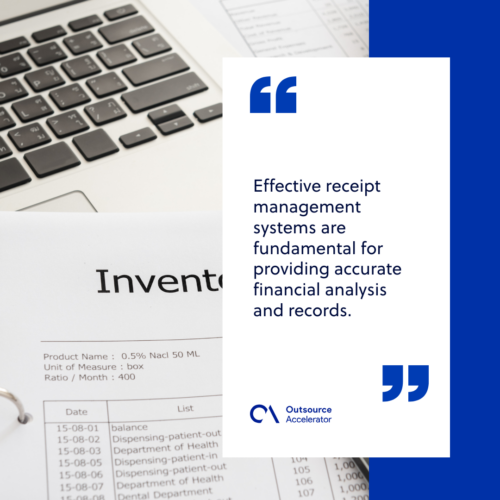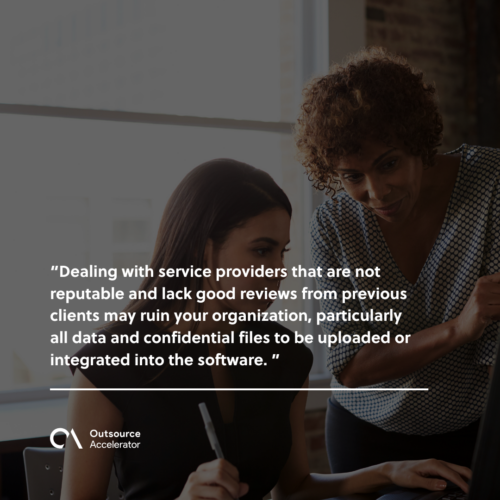4 Main advantages of technology-based tools for effective receipt management

When we talk about business accounting and financial management, the demand for systematic filing, monitoring, and ensuring the completeness and accuracy of transaction receipts is always crucial.
Filing taxes and securing permits require complete records of transaction receipts to ensure that the firm is guided under all applicable rules and regulations when operating a business.
Effective receipt management is one of the core strategies that organizations are adopting. Some are maximizing the use of technology to introduce user-friendly tools for easy recording and tracking.
How do effective receipt management systems transform a business?
Effective receipt management systems are fundamental for providing accurate financial analysis and records. It transforms not just the operational process, but also its credibility by assuring compliance with tax regulations.
Receipt management systems streamline time-consuming and routine tasks with technology such as Software-as-a-Service (SaaS).
The digital copies of receipts and other expense data are stored on external servers. These are accessible through a web browser by assigned users who can enter or log into the system.
Generated data from receipt management systems translates more accurate accounting and financial management reports.

Traditional vs technology-based receipt management
Traditional receipt management involves a repetitive and time-consuming process. In contrast, technology-based software and online tools have streamlined this task and are now widely adopted in the global market.
From manual categorizing, recording, and filing receipts on physical envelopes or folders, all-in-one software applications backed with cloud computing have transformed many business operations.
It encourages digital copies of receipts stored in a cloud server and introduces user-friendly navigation for finance or accounting staff to easily scan, organize, and enter other necessary data.
Advantages of technology-based tools in receipt management
Technology always offers a competitive advantage. As business operations evolve rapidly, industries across various sectors are increasingly embracing digital transformation.
Here are the advantages of having technology-based tools that can help your company with efficient receipt management:
Advantage #1: Process automation
Technology-based tools can instantly organize and categorize receipts, reducing human error and saving more resources for the company.
Some companies outsource software development consultants to customize and make suitable software applications based on the needs and nature of their accounting and financial management.
These tools offer various functionalities that allow staff to quickly retrieve specific receipts by entering dates, keywords, or categories – eliminating the need to manually sort through piles of documents.
Advantage #2: More accurate reporting and expense tracking
Informed and fact-based financial decisions are imperative in every organization. It gives a clear direction and addresses risks that might challenge the operation of the business along the way.
Receipt management tools are enhanced to systematically generate reports of expenses and transactions, leading to more accurate insights and data interpretations on a firm’s spending dynamics.
Technology-based tools can automatically generate expense reports and provide insights into your spending patterns, helping you make informed financial decisions.
Advantage #3: Integration with existing accounting software
Most receipt management tools are designed and capable of seamlessly integrating with the firm’s existing accounting software.
This strategy is known to many software developers since one of the emerging trends in business is to have a single tool that could cater to and work with various systems and processes, particularly in accounting.
The integration of receipt management tools with the existing accounting software of a company makes it easy to sync the tracking of expenses and streamline the generation of financial reports.
Advantage #4: System backup and security features
Receipt management tools are also advantageous in securing transaction receipts and other financial documents.
Most software tools are supported by a cloud, preventing the clients from the risk of instantly losing important documents through natural calamities, fire, physical damage, or even theft.
Top software providers also include security features and packages to ensure clients that all data entered into the systems are protected and safe.
Common challenges of the receipt management process
Although technology-based receipt management has gone far in shaping the systems and processes of the global market, there are still challenges that companies should consider.
Challenge #1: Cost of software application and maintenance
Buying a software application to support your business is quite expensive. Some companies are challenged by the additional expense of acquiring applications and their maintenance.
But in a long-term perspective, the effectiveness and other resources that can be reduced because of the functionality of the tools balance the equation.
Challenge #2: Required technical skills for employees
Most receipt management tools are designed to be user-friendly and intuitive.
However, employees—particularly those less familiar with technology—may struggle to adapt to these innovative features. This learning curve often prompts companies to outsource virtual talent for smoother implementation and operation.
Challenge #3: Dealing with untrusted software providers
It is a must for business leaders to research and know the prospective software providers that they wish to partner with.
Dealing with service providers that are not reputable and lack good reviews from previous clients may ruin your organization, particularly all data and confidential files to be uploaded or integrated into the software.

Technology-based receipt management tools in the progressive global economy
Technology-driven receipt management tools play a crucial role in shaping the modern global economy. They empower businesses to enhance sustainability through transparency, efficiency, and automation.
While some companies may see these tools as an added expense, those that embrace them experience significant improvements in organizational effectiveness.
From ensuring compliance with audit requirements to enabling data-driven decision-making, effective receipt management systems provide businesses with the accuracy and efficiency needed to stay competitive in an evolving marketplace.







 Independent
Independent




